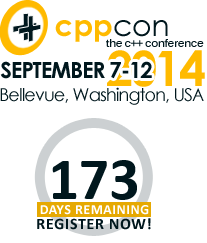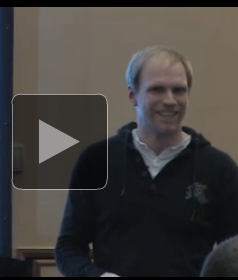CppCon 2014 Registration Open: September 7-12, Bellevue, WA, USA

Registration is now open for CppCon 2014 to be held September 7–12, 2014 at the Meydenbauer Center in Bellevue, Washington, USA. The conference will start with the keynote by Bjarne Stroustrup titled "Make Simple Tasks Simple!"
CppCon is the annual, week-long face-to-face gathering for all C++ users. The conference is organized by the C++ community for the community. You will enjoy inspirational talks and a friendly atmosphere designed to help attendees learn from each other, meet interesting people, and generally have a stimulating experience. Taking place this year in the beautiful Seattle neighborhood and including multiple diverse tracks, the conference will appeal to anyone from C++ novices to experts.
What you can expect at CppCon:
- Invited talks and panels: The CppCon keynote by Bjarne Stroustrup will start off a week full of insight from some of the world’s leading experts in C++. Still have questions? Ask them at one of CppCon’s panels featuring those at the cutting edge of the language.
- Presentations by the C++ community: What do embedded systems, game development, high frequency trading, and particle accelerators have in common? C++, of course! Expect talks from a broad range of domains focused on practical C++ techniques, libraries, and tools.
- Lightning talks: Get informed at a fast pace during special sessions of short, less formal talks. Never presented at a conference before? This is your chance to share your thoughts on a C++-related topic in an informal setting.
- Evening events and “unconference” time: Relax, socialize, or start an impromptu coding session.
CppCon’s goal is to encourage the best use of C++. The conference is a project of the Standard C++ Foundation, a not-for-profit organization whose purpose is to support the C++ software developer community and promote the understanding and use of modern, standard C++ on all compilers and platforms.


 TThe first stable release of the 3.x series of MetaScale’s open-source software is available: NT² 3.0. It also includes its spin-off project, Boost.SIMD (not yet a Boost library). Many Issues have been closed since last beta. The main focus of this release cycle was to fix performances issues and to stabilize some parts of the API.
TThe first stable release of the 3.x series of MetaScale’s open-source software is available: NT² 3.0. It also includes its spin-off project, Boost.SIMD (not yet a Boost library). Many Issues have been closed since last beta. The main focus of this release cycle was to fix performances issues and to stabilize some parts of the API.
 A nice short overview of when you might want your associative container to use a contiguous implementation instead of a tree under the covers:
A nice short overview of when you might want your associative container to use a contiguous implementation instead of a tree under the covers: Speaking of
Speaking of